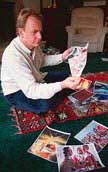
"On December 17, 1997, I was working in my living-room office on my computer next to a fire,"1 McWilliams reported in a Liberty magazine article last year.
A hard pounding on the door accompanied by shouts of "Police! Open up!" broke the silence, broke my reverie, and nearly broke down the door. I opened the door wearing standard writer's attire, a bathrobe, and was immediately handcuffed. I was taken outside while Drug Enforcement Administration (DEA) agents ran through my house, guns drawn, commando-style. They were looking, I suppose, for the notorious, well-armed, highly trained Medical Marijuana Militia. To the DEA, I am the Godfather of the Medicine Cartel. Finding nothing, they took me back into my home, informed me I was not under arrest, and ordered me—still in handcuffs—to sit down. I was merely being "restrained," I was told, so the DEA could "enforce the search warrant."2
The DEA also took the trouble of confiscating McWilliams's computer and his research materials on medical marijuana.
In 1967, at age 17, McWilliams began his career by writing poetry. He went on to self-publish books about meditation, coping with depression, surviving the loss of a loved one, and computers, among other varied subjects. He has also authored a popular "Life 101" series of self-help books.
In 1993 he published Ain't Nobody's Business If You Do: The Absurdity of Consensual Crimes in Our Free Country; a revised edition was put out a few years later. McWilliams would soon fall victim to the same noxious interventionism of the Busybody State that is the subject of his book.
In mid-March 1996 I was diagnosed with both AIDS and cancer. ... I had not smoked marijuana or used any other illicit drug for decades prior to this (a decision I now regret). But since 1996 I owe my life to modern medical science and to one ancient herb.
And so I became an outspoken advocate for medical marijuana. In 1996, before the passage of California Proposition 215 (the Medical Marijuana Act), I donated office space to a cannabis club so it could sell marijuana to the sick. I also started the Medical Marijuana Magazine on-line in February 1997; testified in favor of medical marijuana before the California Medical Examiners Board and the National Academy of Sciences; and appeared as a medical marijuana advocate in or on numerous media, including CNN, MSNBC, The Los Angeles Times , Associated Press, United Press International, CBS Radio Network, and dozens more.
For a sick guy, I've been around. (Actually, I've been around, and that's how I got to be a sick guy, but that's another story.) Most disturbing to the DEA, I would guess, was my strong criticism of it in a two-page ad I placed in the December 1, 1997, Daily Variety. I denounced Administrator Constantine's threat to criminally investigate the creators of Murphy Brown for Murphy's fictional use of medical marijuana. Having made comments such as, "The DEA gives the phrase 'ambulance chasing' a whole new meaning,' I'm surprised it took the DEA 17 days to find my house—but, then, they are part of the government.3
In order to be released on bond following his arrest, McWilliams had to agree to stop smoking it. The agreement was enforced by random testing, and he lost 30 pounds as a result. He admits to no "conspiracy," only to growing marijuana for his own use as a last medical resort. A November 1999 date had been set for a trial, but McWilliams and the government have now reached a settlement of the case4.
Copyright © 2000, The Daily Objectivist - Reprinted with permission of The Daily Objectivist and Davidmbrown.com.
20 Feb 2009 (last edit: 13 Feb 2024)
You can assist the work of Freedom Circle by purchasing one of the works discussed above:
-
Ain't Nobody's Business If You Do: The Absurdity of Consensual Crimes in a Free Society
-
Life 101: Everything We Wish We Had Learned About Life in School—But Didn't
-
Peter McWilliams, "The DEA Wishes Me a Nice Day", Liberty, Vol. 11, No. 5, May 1998, p. 28. (Freedom Circle note) ↩︎
-
Ibid. ↩︎
-
Ibid., p. 29. (Fredom Circle note) ↩︎
-
Peter McWilliams died on 14 June 2000, while awaiting sentencing after a trial where his only choice was to plead guilty since the judge ruled he could not mention that he was terminally ill. See David Rosenzweig, "Peter McWilliams; Backed Medical Use of Marijuana", Los Angeles Times, 17 June 2000. (Freedom Circle note) ↩︎
